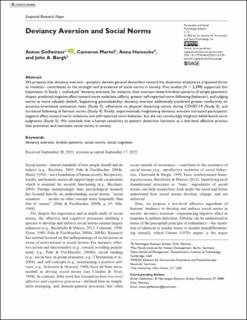Deviancy Aversion and Social Norms
Peer reviewed, Journal article
Published version
Permanent lenke
https://hdl.handle.net/11250/3042022Utgivelsesdato
2022Metadata
Vis full innførselSamlinger
- Scientific articles [2181]
Originalversjon
10.1177/01461672221131378Sammendrag
We propose that deviancy aversion—people’s domain-general discomfort toward the distortion of patterns (repeated forms or models)—contributes to the strength and prevalence of social norms in society. Five studies (N = 2,390) supported this hypothesis. In Study 1, individuals’ deviancy aversion, for instance, their aversion toward broken patterns of simple geometric shapes, predicted negative affect toward norm violations (affect), greater self-reported norm following (behavior), and judging norms as more valuable (belief). Supporting generalizability, deviancy aversion additionally predicted greater conformity on accuracy-orientated estimation tasks (Study 2), adherence to physical distancing norms during COVID-19 (Study 3), and increased following of fairness norms (Study 4). Finally, experimentally heightening deviancy aversion increased participants’ negative affect toward norm violations and self-reported norm behavior, but did not convincingly heighten belief-based norm judgments (Study 5). We conclude that a human sensitivity to pattern distortion functions as a low-level affective process that promotes and maintains social norms in society

